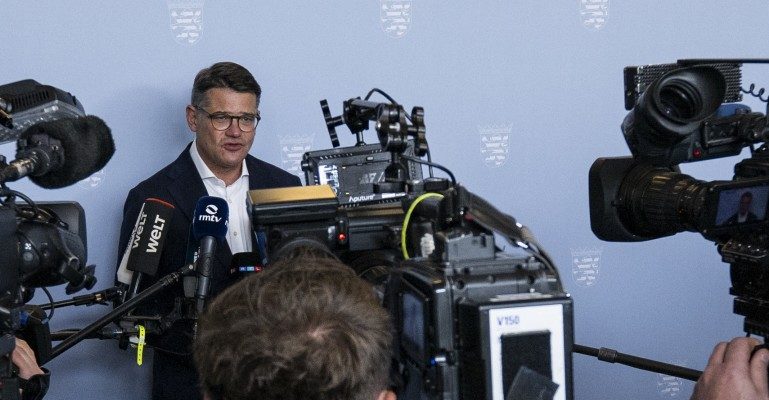What’s next with the issue of immigration? A kind of migration summit between the prime ministers and presidents with Chancellor Olaf Scholz (SPD) and CDU leader Friedrich Merz is planned for Friday evening. Previously, Stephan Weil (SPD) and Boris Rhein (CDU) appeared before the press in Frankfurt to explain what the states had in mind for the political agenda for the next few weeks. Afterwards, both of them continued quickly towards Berlin.
After two days of talks, the Prime Minister’s Conference (MPK) is calling for a limitation on migration and faster decisions on asylum applications. “We hold firmly to our country’s humanitarian standards. But in addition to humanity, order must be added as a second guideline,” said Lower Saxony’s Prime Minister Weil. “Migration must not happen in a disorderly manner. That’s what the citizens expect from us.”
Hesse’s Prime Minister Rhein added that the federal government had a duty to eliminate “false incentives” for immigration. Greater efforts are also needed to conclude new take-back agreements with the countries of origin.
Asylum procedures with little chance of success should be accelerated
The Prime Ministers also speak of “broad political agreement” that the number of refugees to be accepted into Germany must fall “significantly and sustainably”. This year, more than 300,000 people are expected, 60,000 more than last year.
The MPK specifically proposes to speed up the asylum process, especially for those who have little chance of recognition. “We have to work particularly quickly where the prospects of recognition are particularly low,” said Weil. A process duration of three months is realistic. Such acceleration and prioritization could be much more effective in practice than a continued “fruitless debate about safe countries of origin.”
The conference also called for the introduction of a nationwide cash card for asylum seekers and refugees to be examined instead of cash payments. It should also be possible to work in Germany in a less bureaucratic manner if there are good prospects of staying. With a view to the war in the Middle East, the countries emphasize that Germany and Europe should not become a refuge for Hamas members or their supporters.
The 49 euro ticket involves a lot of money – the dispute is coming to a head
Meanwhile, the dispute over the 49-euro ticket between the federal and state governments is also coming to a head. “The federal government has to move,” demanded Rhein. “We countries have a great interest in it continuing. We didn’t start it in order to stop it so quickly.” The states expressed their anger at the federal government’s refusal to contribute to additional costs for the billion-dollar project. It cannot be the case that Transport Minister Volker Wissing refuses to pay more for the ticket, criticized Lower Saxony’s Prime Minister Stephan Weil (SPD). The states expected the FDP politician to fulfill his obligation.
The dispute involves a lot of money. The ticket was introduced as a permanent offer in May. Since then, Germans have been able to travel on all local and regional transport nationwide for 49 euros per month. But complete financing is only secure for this year. At the beginning of the year, the federal and state governments agreed to finance half of the Deutschlandticket with a total of three billion euros until 2025. Any additional costs, for example for the introduction and digitalization of the ticket, are only covered this year – the federal and state governments also want to share them. From next year onwards, there is a risk of a gap due to additional costs. Only the federal states are so far prepared to continue to shoulder them. Wissing rejects a corresponding promise.
Bavaria’s Transport Minister Christian Bernreiter emphasized at the transport ministers’ conference on Thursday that the possibility of an end to the 49-euro ticket was not an “empty threat”. “The municipalities say that if there is no commitment, then we will let it expire – because they won’t take the risk.” There is enough money for the current year, but not for 2024 and the following years. An end to the ticket would be “a shame,” said Bernreiter.
Back to the topic of asylum: “I am also very grateful to the Chancellor for tackling this issue in this way,” said Boris Rhein. First the discussions between the Prime Ministers in Frankfurt and then the conversation in the evening in Berlin – that fits together very well. “I think this is how you can really lead a country so that the citizens have the feeling that they care, that they have it under control and that they are making big steps,” said Rhein. And set off towards the capital.

